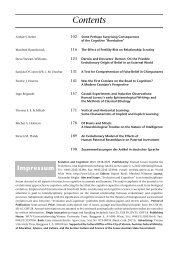The Seven Sins of Evolutionary Psychology - Konrad Lorenz Institute
The Seven Sins of Evolutionary Psychology - Konrad Lorenz Institute
The Seven Sins of Evolutionary Psychology - Konrad Lorenz Institute
Create successful ePaper yourself
Turn your PDF publications into a flip-book with our unique Google optimized e-Paper software.
A Continuing Critique <strong>of</strong> <strong>Evolutionary</strong> <strong>Psychology</strong>views, we <strong>of</strong>ten veer far from the middle road. We alltend to do that. We are all prisoners <strong>of</strong> our times andtypically <strong>of</strong> intellectual tribes that have strong expectationsconcerning proper behaviors <strong>of</strong> theirmembers. And all too <strong>of</strong>ten we are also captives <strong>of</strong>our political biases and our remarkable left-hemispherelanguage skills, which all too <strong>of</strong>ten comesclose to mere confabulation rather than reasonableargumentation (for perhaps too creative a critique <strong>of</strong>this human dilemma, see PANKSEPP 2000).And so what are our own politics? (1) we are committedto accepting our animal nature and at timeswe may veer rhetorically a bit too far in the zoomorphicdirection; (2) we are committed to accepting theaffective complexity (and cognitive also) <strong>of</strong> other animalsand we may <strong>of</strong>ten sound a bit too anthropomorphicbecause we do believe that it is fundamentallycorrect that other mammals have many basicemotional feelings not all that different than ourown; (3) we have a commitment to a deep sense <strong>of</strong>human freedom and plasticity, and we may <strong>of</strong>tenclaim that humans have more cortico–cognitivechoices than they, in fact, do (but we should all hopethat they might); and (4) we have a commitment tohuman justice and paradoxically, that may lead ourprose to be a bit more heated than it should be. Wetruly regret if we were unfair to any <strong>of</strong> our commentatorsand we are sorry if some <strong>of</strong> their importantissues were not addressed as fully as they could havebeen.<strong>The</strong> Sin <strong>of</strong> AnthropocentrismIn closing, let us simply reiterate our thanks to allthe commentators for participating in this discussionand refresh our call to the many prominent figuresin the field who, so far, have chosen to remainsilent on these important issues. 1 We are personallycommitted to the importance <strong>of</strong> evolutionaryviews for understanding our deep nature. We donot believe that it can be done without a full confrontationwith the emotional tendencies <strong>of</strong> ourfellow animals. We thank evolutionary psychologistsfor opening up the debateabout human nature once more,and we encourage them to helpcorrect the deep flaw in our educationalsystems and societalinstitutions that continue to marginalizethe essential understanding<strong>of</strong> the basic underlyingissues—concepts that must bederived from our human understandingbut detailed knowledge <strong>of</strong> which can typicallyonly be derived from well-conducted researchon and with our fellow animals. We were quitepleased that GARDNER has found our ‘rat laughter’research to be intriguing, and that story line continuesto yield interesting findings (BURGDORF/PANKSEPP 2001; BURGDORF et al. 2001).Our recognition <strong>of</strong> human potentials will bemuch more pr<strong>of</strong>ound when we realize how our general-purposeneocortical expansions have enabledour own capacity to elaborate on the geneticallyingrainedsolutions that evolution so ‘kindly’ provided.Clearly, our expansive neocortex has permittedthe emergence <strong>of</strong> an unprecedented culturalevolution. This neuro-evolutionary passageemerged too rapidly, or so it seems to us, for anyhighly-resolved, sociobiologically-engraved strategiesto have emerged within the expanding neocorticaltissues. <strong>Evolutionary</strong> psychologists should beginto entertain the full complexity <strong>of</strong> our animaliannature. With the recent emergence <strong>of</strong> more balancedviews (e.g., BADCOCK 2000), the future <strong>of</strong> thefield seems bright, especially if it can rectify and freeitself from the many fledgling mistakes it has alreadymade.In closing, we also note that many <strong>of</strong> the issuesthat we raised in our target article were concurrentlybeing addressed by one <strong>of</strong> the fathers <strong>of</strong> modularityand cognitive science. We are delighted thatJerry FODOR recently chose to provide a frank analysis<strong>of</strong> what has or has not been achieved by thecognitive and evolutionary psychology perspectives:“In fact, what our cognitive science has doneso far is mostly to some throw [sic?] light on howmuch dark there is. So far, what our cognitive sciencehas found out about the mind is mostly thatwe don’t know how it works” (FODOR 2000, p100).We suggest that this is largely because evolutionarypsychology has devoted so little thought to understandingthe basic neuro-emotional and motivationalprocesses upon which both human and animalminds are built. This neglect has, we suspect,been largely due to the dualistic, anti-organic biasin psychology and philosophy,as well as themore recent siren-songAuthors’ addressJaak Panksepp and Jules B. Panksepp,J.P. Scott Center for Neuroscience, Mind &Behavior, Departments <strong>of</strong> <strong>Psychology</strong> andBiological Sciences, Bowling Green StateUniversity. Emails: jpankse@bgnet.bgsu.eduor julesp@caspar.bgsu.eduattractions <strong>of</strong> computersand computationalism.To continue FODOR’s lament(p39): “you mightthink that cognitive scientistswould be worrieda lot about the limitationsEvolution and Cognition ❘ 77 ❘ 2001, Vol. 7, No. 1








